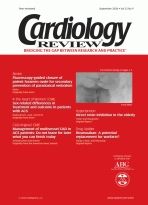An elderly woman with heart failure and preserved ejection fraction
A 70-year-old woman presented to the emergency department with acute onset of shortness of breath that awakened her from sleep.
A 70-year-old woman presented to the emergency department with acute onset of shortness of breath that awakened her from sleep. She had a long-standing history of hypertension and diabetes. Three months earlier, she had undergone angioplasty with stent placement in the right coronary artery. Prior to this presentation, she had stable dyspnea on moderate exertion, but no angina. Her cardiac medications included hydrochlorothiazide (Microzide), metoprolol (Lopressor, Toprol-XL), lisinopril (Prinivil, Zestril), clopidogrel (Plavix), and simvastatin (Zocor). Although usually adherent to her medication regimen, the patient said that she had run out of metoprolol and hydrochlorothiazide the day prior to admission. She also said that she had eaten at a Chinese restaurant the day prior to admission.
At presentation, the patient had a blood pressure of 180/95 mm Hg, and she was tachypneic, with a heart rate of 100 beats/minute. Her jugular venous pressure was mildly elevated, and chest examination showed bilateral crackles a third of the way up. The results of the heart examination were normal except for an S4 gallop. There was no hepatomegaly or pedal edema. Chest x-ray showed cardiomegaly and bilateral interstitial edema. The electrocardiogram showed sinus tachycardia, left atrial enlargement, and left ventricular hypertrophy (LVH), but no new ST-T wave changes.
The patient was given intravenous furosemide (Lasix) and metoprolol along with nitroglycerin (Nitro-Bid, Nitro-Dur, Nitrostat). Within an hour, she excreted 600 mL of urine, and her symptoms improved. Her blood pressure decreased to 144/80 mm Hg. She was observed in the hospital over the next 24 hours. Serial cardiac enzyme studies were negative for cardiac injury. While taking her usual medications, her blood pressure remained at 140/80 mm Hg. An echocardiogram showed moderate concentric LVH, with a small left ventricular cavity, a left ventricular ejection fraction of 60% to 65%, mild left atrial enlargement, and elevated left ventricular filling pressures. The patient was asymptomatic at rest and with walking a few steps in the corridor. She was discharged on a higher dose of lisinopril and furosemide, in addition to other baseline medications. As an outpatient, she underwent a nuclear stress thallium test, which was negative for ischemia. The patient returned to her baseline state of New York Heart Association (NYHA) functional class II dyspnea on exertion; her blood pressure decreased to 130/76 mm Hg, and furosemide was discontinued because she developed mild orthostatic symptoms with prerenal azotemia.
This case report is illustrative of an elderly woman with acute decompensation of heart failure with preserved ejection fraction. Female sex, hypertension with LVH, and diabetes are predisposing factors to the development of heart failure with preserved ejection fraction. Nonadherence to antihypertensive medication along with a large salt load likely precipitated the acute decompensation in this patient, who had underlying diastolic dysfunction. Although she had a history of intervention for underlying coronary heart disease, ischemia was ruled out as a significant contributor to her condition. In addition, the underlying diastolic dysfunction related to hypertension with LVH was the likely cause of her baseline dyspnea on exertion. Treatment recommendations for such a patient include aggressive blood pressure control with consideration of angiotensin-converting enzyme inhibitors or angiotensin receptor blockers, especially in the presence of diabetes and coronary heart disease; use of beta blockers in patients with angina, prior myocardial infarction, or atrial fibrillation; use of a low-sodium diet; and use of diuretics as needed.
